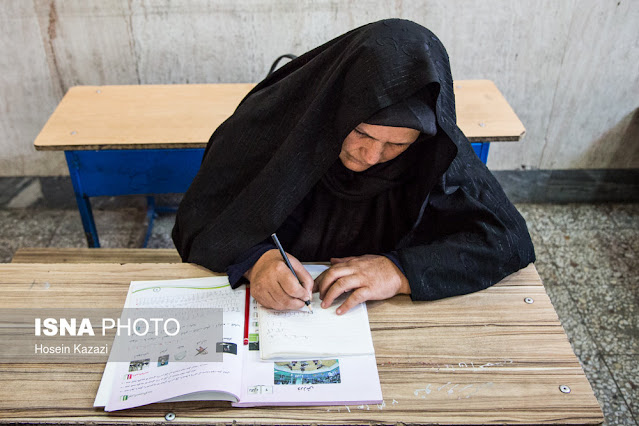ISNA - Dec 22, 2017
 |
| According to official statistics, a significant portion of the illiterate population in the province consists of women, highlighting a notable gender disparity in literacy rates. |
The Deputy Director of Literacy at East Azerbaijan Education Department stated that currently, 141,918 people in our province are illiterate, adding that of this number, 93,125 are women and 48,000 are men.
Mohammad Hossein Ashrafi, the Deputy Director of Literacy at the East Azerbaijan Education Department, stated that a family with illiterate or undereducated parents suffers from "cultural poverty" and is more exposed to various social harms, such as addiction, divorce, and more.
He added that the National Literacy Movement has been organizing computer and ICDL training courses to promote literacy, and pointed out that anyone who cannot use a mobile phone or the internet is considered illiterate. Therefore, computer training courses are being held in 12 regions of the province.
He also referred to the literacy census for the age group of 10 to 49 years in 2016, stating that in the 2011 census, East Azerbaijan had a literacy rate of 92.1% and an illiteracy rate of 7.1%. In the 2016 census, the literacy rate increased to 93.3%, while the illiteracy rate decreased to 5.7%.
He emphasized that according to statistics, the illiteracy rate among women and girls is higher than among men in the country. Therefore, focusing on the education of girls and women is a priority for the country's educational system, as an educated mother positively influences the upbringing and support of her children. An educated mother can raise not only one individual but an entire generation.
The Deputy Director also mentioned that illiterate individuals can register and gather information about literacy courses at the literacy centers, regional offices, and schools throughout the province. A payment of approximately 680,000 toman is made as an instructor's fee for each person in the literacy program, with about one million toman allocated for instructors teaching disabled individuals and those in rural areas.
He continued, explaining that individuals unable to physically attend literacy classes can study at home on their own, using free books provided by the National Literacy Movement and taking part in exams. If they pass the exams, they will be awarded an incentive of 720,000 toman.
He also called on officials and the public to collaborate in eradicating illiteracy from society. He noted that every family could serve as a representative for the country's literacy movement, and by motivating illiterate family members, they can take an effective step in this direction.
Ashrafi concluded by stating that to eliminate illiteracy from society, there is a need for widespread cultural awareness about education, cooperation with educators to identify illiterate individuals, the implementation of the "Illiterate Parents" program in society, and collaboration in providing suitable educational spaces.
Link to the original text in Farsi on ISNA:
141 هزار و 918 نفر در آذربایجان شرقی بیسواد هستند
